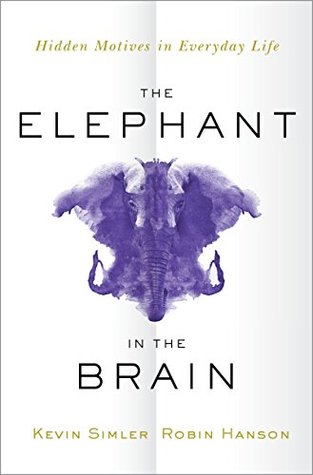More on this book
Community
Kindle Notes & Highlights
by
Kevin Simler
Read between
November 20 - December 9, 2018
If I behave badly, my Jewish peers are liable to punish me for tarnishing our collective reputation. Knowing this, you can more readily trust that I’ll behave according to accepted Jewish standards of conduct.
one of the best ways to convince others of one’s belief is to actually believe it. This is how it ends up being in our best interests to believe in a god that we may not have good evidence for.
The ideal situation would be for the brain to be able to have its cake (convincing others that it fears God’s wrath) and eat it too (go on behaving as if it didn’t fear God at all). But human brains aren’t powerful enough to pull off such perfect hypocrisy, especially when others are constantly probing our beliefs.
“selfishly,” however, the bigger problem is that voting doesn’t make sense as an economic activity.
win, the odds were closer to 1 in 10 billion.8 That’s an astonishing 1,000-fold difference. Faced with these realities, pragmatic Do-Rights
This is the key to making sense of our political behavior. It’s not just an attempt to influence outcomes; it’s also, in many ways, a performance.
In fact, this political favoritism was stronger than racial favoritism.
Holding constant the quality of their publications, Republican academics (compared to Democrats) have jobs at significantly lower-tier colleges. This effect is larger than the effect for women, who also seem to face discrimination in academic jobs.34
We’ve all been in situations where we’ve had to admit to an unpopular political opinion, and we don’t suddenly change our minds for fear of a few disapproving scowls.
First, and perhaps most important, the desire to signal loyalty helps explain why we don’t always vote our self-interest (i.e., for the candidates and policies that would bring us, as individuals, the greatest benefit). Rather, we tend to vote for our groups’ interests.38 Naturally, on many issues, our group and self-interests align. But when they don’t, we often choose to side with our groups. In this way, politics (like religion) is a team sport.
While political scientists are mostly agnostic about why people like to express themselves at the voting booth, some treat expressive voting as an act of consumption—something we do in order to feel good, without concern for external benefits.
Loyalty Demands Sacrifice
Anyone can act sensibly in their narrow self-interest. In order to demonstrate loyalty, we have to do things that other, less loyal people wouldn’t do—
“I care so much about ‘our side’ in politics that I’m even willing to forego professional opportunities.”
If politics is a team sport, “rational” voting is like playing Tetris alone in the corner.
Loyalty Demands (Strategic) Irrationality
irrationality. For our beliefs to function as loyalty signals, we can’t simply “follow the facts” and “listen to reason.” Instead, we have to believe things that are beyond reason, things that other, less-loyal people wouldn’t believe.
A common symptom of loyalty signaling is an unwillingness to compromise.
compromise can be very attractive, since it’s often the best way to make progress.
politics as a performance, like an apparatchik, you don’t care about outcomes as much as you care abo...
This highlight has been truncated due to consecutive passage length restrictions.
That is, political groups tend to join alliances until there are only a few major coalitions, after which members show loyalty by focusing on issues that most clearly distinguish them from opposing coalitions. (And with only two main coalitions, only one main dimension separates them.)
“Our virtues are most frequently but vices in disguise.” “We cannot look squarely at either death or the sun.” FRANÇOIS DE LA ROCHEFOUCAULD, 1678
(It’s hard to look directly at the elephant!)
“I’m doing this for your benefit,” says every teacher, preacher, politician, boss, and parent.
When meetings at work seem like an unnecessary waste of time, such waste may in fact be the point; costly rituals can serve to keep a team cohesive or help anxious leaders cement control over their subordinates.
We shouldn’t let other people make us feel inferior—at least, not without our consent.
to see ourselves as others see us.
There’s common ground in almost every conflict,
If we want to improve ourselves, it must somehow be through our biological heritage.
By the same token, we can’t ignore incentives—for example, by telling people that “good behavior” requires them to abandon their self-interest. The more sacrifice and suffering we demand in the name of virtue, the less rewarding it will be—and taken to an extreme, it means that “bad” people will fare better than “good” ones in our society.
“enlightened self-interest.” This is the notion that we can do well for ourselves by doing good for others.
“What are this institution’s hidden functions, and how important are they?” Take
One promising approach to institutional reform is to try to acknowledge people’s need to show off, but to divert their efforts away from wasteful activities and toward those with bigger benefits and positive externalities.
Straightforward characters aren’t nearly as compelling, perhaps because they strike us as less than fully human.
our genes long ago decided that, in the relentless competition to survive and reproduce, their best strategy was to build ethical brains.


